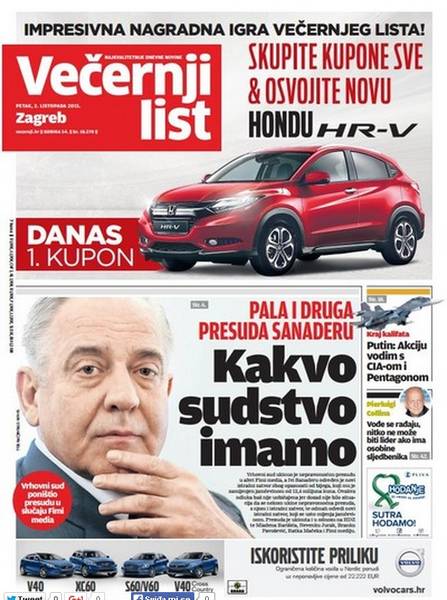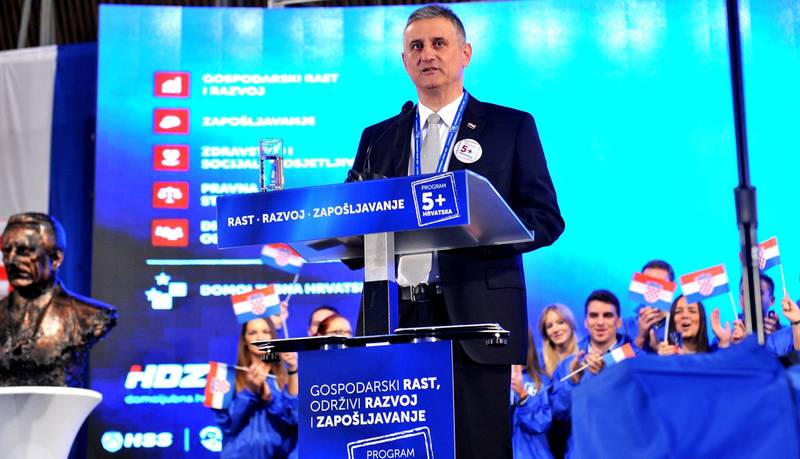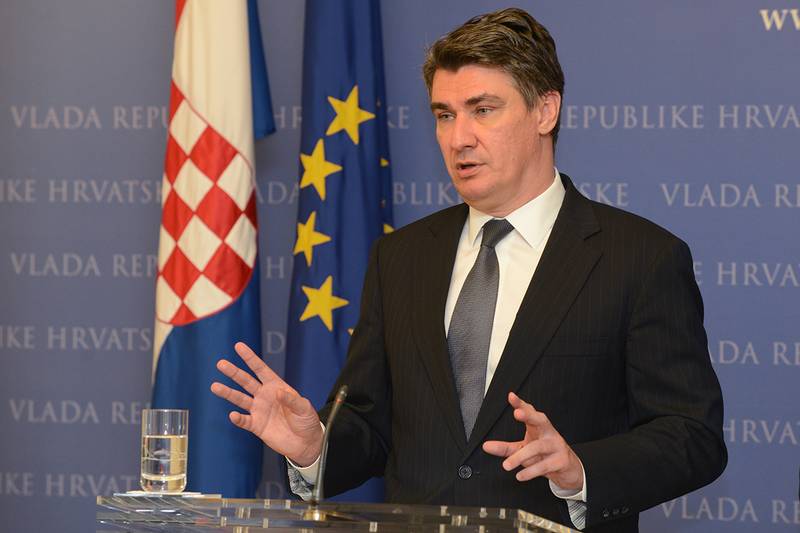Pre-election Sobering With a Tang of Sanader
Adelina Marini, October 2, 2015
 Has the white swallow of enlargement turned black? This is a question that perhaps many are pondering both in the former Yugoslavia region and in Brussels, who saw Croatia as a guiding light for the rather murky process of enlargement towards South-East European countries. After the EU accepted Bulgaria and Romania unprepared and with a special mechanism to monitor their efforts in battling corruption and organised crime it seemed the Union had learned its lessons for it applied much stricter control on the next candidate – a member of the EU since July 1st 2013 – Croatia. This was the first state in South-East Europe to have a former Prime Minister and a political party convicted of corruption.
Has the white swallow of enlargement turned black? This is a question that perhaps many are pondering both in the former Yugoslavia region and in Brussels, who saw Croatia as a guiding light for the rather murky process of enlargement towards South-East European countries. After the EU accepted Bulgaria and Romania unprepared and with a special mechanism to monitor their efforts in battling corruption and organised crime it seemed the Union had learned its lessons for it applied much stricter control on the next candidate – a member of the EU since July 1st 2013 – Croatia. This was the first state in South-East Europe to have a former Prime Minister and a political party convicted of corruption.
It was exactly the conviction of former PM Ivo Sanader that opened the door for Croatia to enter the EU without a safety mechanism like the one for Bulgaria and Romania. It brought considerable freshness in the enlargement process and set a target for the other states of the Western Balkans region. It even came to journalists requesting jokingly (or perhaps very seriously) that convicting a former PM becomes a leading condition for the accession of new states from the region into the EU. Regardless of Romania positioning itself as an anti-corruption leader in South-East Europe with its dozens of convictions of high-ranking politicians, Croatia remains the cherry on the cake with its convictions of a former Prime Minister and the largest opposition party in the country – the Croatian Democratic Union (HDZ). The problem, however is that the convictions were not final.
In a ruling yesterday, the Supreme Court overthrew a second sentence against Mr Sanader. He was sentenced to prison on two cases. One is for a personal military enrichment (war profiteering) by accepting a commission from the Austrian Hypo Bank for making sure it is this bank that extends a loan to the state at considerably higher than market-average interest levels. He was also sentenced for accepting a bribe from Hungarian petrol company MOL, which owns a considerable portion of the Croatian state-owned petrol company INA. In this case the Constitutional Court ruled in the beginning of summer that Ivo Sanader’s rights as a defendant were violated. The court found numerous process violations in the trial, which will be re-opened. The Supreme Court in turn dismissed the ruling of the Zagreb District Court from 2012 with which Ivo Sanader was convicted in his capacity as leader of the HDZ for draining state funds through the PR company Fimi Media.
 With its ruling the Supreme Court sends back the case for a retrial to the District Court in Zagreb. At the same time, a rather curious element of the ruling [in Croatian] of the court of higher instance is that it does not make Ivo Sanader a free man. He will be able to walk free only if he pays 12.4 million Kuna (1.6 million euro) bail. Even if he manages to raise the money and pay it, Mr Sanader will continue being semi-free, for the court imposed two important restrictions on him. His travel documents are taken away and he has to show up every first Monday of the month between the hours of 08:30 and 15:00.The reason for this ruling is that he effectively remains under investigation for this one and other cases against him. The concern about Ivo Sanader fleeing justice is well founded having in mind that he was arrested in Austria during an escape attempt.
With its ruling the Supreme Court sends back the case for a retrial to the District Court in Zagreb. At the same time, a rather curious element of the ruling [in Croatian] of the court of higher instance is that it does not make Ivo Sanader a free man. He will be able to walk free only if he pays 12.4 million Kuna (1.6 million euro) bail. Even if he manages to raise the money and pay it, Mr Sanader will continue being semi-free, for the court imposed two important restrictions on him. His travel documents are taken away and he has to show up every first Monday of the month between the hours of 08:30 and 15:00.The reason for this ruling is that he effectively remains under investigation for this one and other cases against him. The concern about Ivo Sanader fleeing justice is well founded having in mind that he was arrested in Austria during an escape attempt.
Regarding the political party HDZ, which currently has the lead in polls and has ambitions for winning the parliamentary elections in November, it is still not completely acquitted for its case is also returned for a retrial.
Innocent until ... winning the elections
As early as the beginning of summer, publications appeared in Croatian media that the first instance rulings against Ivo Sanader and the HDZ are expected to be confirmed or rejected in autumn, right in the middle of the campaign for the regular parliamentary elections that don’t have an exact date set yet. It is expected that President Kolinda Grabar-Kitarović will announce the date in the beginning of next week, but the delay of this process raises a number of questions. Announcing the date after the ruling of the Supreme Court will allow the HDZ to enter the election campaign as an innocent political party.
This is the reason why Croatian media are suspicious of the Croatian justice system and are looking for political influence over it on such important matters both to Croatia’s democratic future and to the entire region in its road toward European membership. For if it turns out that Croatian justice is not politically independent, this could mean a considerable delay in the way towards EU membership for Montenegro, which is the only state the EU is negotiating with at the moment. Tarnishing the image of Croatian justice could have a negative effect on Serbia as well, which has not yet began real negotiations and this will have purely geopolitical consequences to the region and the EU as a whole. The effect on them will be manifested in an even closer monitoring of their work on the creation of an independent justice system and rule of law.
The coincidence of the overruling of first-instance rulings against Ivo Sanader and especially against HDZ with the official opening of the election campaign will undoubtedly have effect on the campaign. The governing left-liberal coalition led by Prime Minister Zoran Milanović is running a campaign that rests on two major pillars. The first one is constantly reminding that the HDZ is a criminal party, which is to blame for the systematic robbery of the Croatian people and whose former leader is in prison. The second pillar of the “Croatia is Growing” coalition is that their opponents of the Patriotic coalition led by the HDZ are not the only patriots. Zoran Milanović has totally usurped the patriotic rhetoric of his opponent, which the HDZ had been building up as a foundation to its campaign over the last two years.
When asked about the Supreme Court ruling Prime Minister Zoran Milanović stated that he cannot comment on a court ruling, but stressed: “I have not been a part of that government like some, who want to be Prime Minister now. Such is their society. To me they are foreign”. As was expected, the HDZ cheered the court ruling. “This ruling of the Supreme Court removes the stigma from the party and the collective responsibility of 220 000 HDZ members. From the very beginning we have been arguing that the party is not and could not be guilty of what it is charged with,” is said in an official party statement.
The decision of the court of first instance to convict a whole party as a legal entity is a legal novelty. Chairwoman of the panel that convicted the HDZ last year Ivana Čalić sent a strong message back then: "This is a message to all legal entities, political parties, therefore to their members, about what the responsibility of political parties is and that everyone will pay for their responsibility, including those who are not directly involved in the specific crime. In this case, just like the heirs pay the debts of their predecessors, the parties' responsibility as legal entities stems from individuals who are responsible. The citizens who are deprived of rights, poor, soulless have lost belief in institutions because the greed of the so called elites  has led those who elected them to misfortunes. This sentence is also a compensation because the convicts will pay back everything they took as benefits".
has led those who elected them to misfortunes. This sentence is also a compensation because the convicts will pay back everything they took as benefits".
Stakes are extremely high in the upcoming parliamentary elections. Thus the challenges faced by Croatian justice are historic. It needs to prove it is independent and is ruling entirely in accordance with the rule of law. It will also be its responsibility to prove it has nothing to do with the delayed announcement of the date for the elections or with any political power. This responsibility extends way further than the borders of little Croatia. Stakes are high not only of membership candidate states, but the negotiators from Brussels as well, who will get the stain again that their radar could not intercept the repeated attempt to enter the EU loudly and on a shiny image with no substance. Over the last four years Croatia has been trying to establish itself as a Western state in all meanings – rule of law, democracy, and relentless battle with corruption. Will Croatia go back to its Balkan roots or will it stay Western? This is the task Croatian justice is facing.
Translated by Stanimir Stoev
 Kolinda Grabar-Kitarovic | © KGK
Kolinda Grabar-Kitarovic | © KGK Jozo Rados | © European Parliament
Jozo Rados | © European Parliament Aleksandar Vucic, Andrej Plenkovic | © Vlada RH
Aleksandar Vucic, Andrej Plenkovic | © Vlada RH